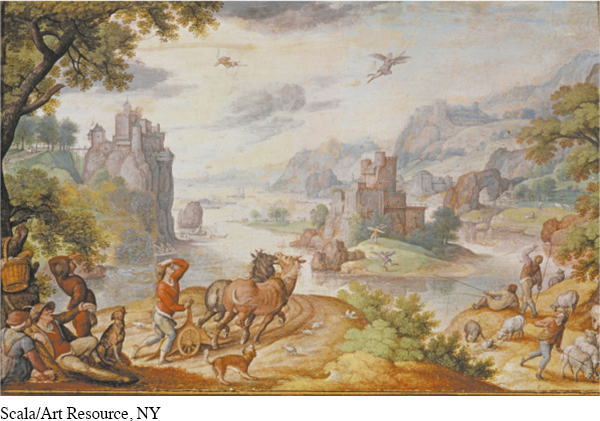Landscape with the Fall of Icarus
William Carlos Williams

William Carlos Williams (1883–
According to Brueghel
when Icarus fell
it was spring
a farmer was ploughing
5 his field
the whole pageantry
of the year was
awake tingling
near
10 the edge of the sea
concerned
with itself
sweating in the sun
that melted
15 the wings’ wax
unsignificantly
off the coast
there was
a splash quite unnoticed
20 this was
Icarus drowning
seeing connections
Here is a second painting of the Icarus myth, created by Dutch painter Ferdinand Bol almost one hundred years after Bruegel’s painting.
Compare and contrast this depiction of the Icarus myth to Bruegel’s (p. 319). How does each painting reflect a different interpretation of the significance of that myth? Base your response on the details you observe. If Auden and Williams wrote poems about this painting, how would their poems have to change?

Understanding and Interpreting
The poem describes the scene as taking place in the spring. What effect does placing Icarus’s death in spring have on the ideas in the poem as a whole?
In mythology, Icarus’s drowning is a tragic and significant event. However, in this poem, Icarus’s death is reduced to a “splash quite unnoticed” (l. 19). What ideas about mythology as a whole does Williams offer by minimizing the significance of this event?
What is the speaker’s conclusion about Bruegel’s interpretation of the fall of Icarus?
Analyzing Language, Style, and Structure
Each line in this poem is composed of no more than four words, with a couple of lines made up of only a single word. How does this brevity contribute to the ideas in the poem?
Even though there are line breaks, the ideas often are carried from one stanza to the next. What effect does this stylistic choice have on the poem as a whole?
In line 16, the speaker uses the word “unsignificantly.” How does this word vary in meaning from “insignificantly,” and what is the effect of using this invented word?
Connecting, Arguing, and Extending
The inspiration for this poem was Bruegel’s painting of the same name, shown on page 319. The myth dates back to around 800 B.C., and the painting was completed in 1558, separating these two pieces by over two thousand years. Williams’s poem presents a specific interpretation of that more recent painting, rather than focusing on the ancient myth. How might the poet’s choice to focus on the painting itself rather than the myth make it more relevant to a modern audience? In what ways might he be adding his artistic voice to an ongoing conversation between artists by focusing on the painting?
Using details from the poem and your understanding of the myth of Icarus, write a response in which you identify the argument Williams is making regarding Bruegel’s painting. Then explain whether or not you agree with Williams’s assertion and why.
This poem is a direct response to a painting. Think of a painting with which you are familiar, or go online and find a painting that interests you. Write a poem about the painting you have selected. Then, write a commentary about what interested you about the piece, what your poem tried to capture about the painting, and what you learned from the process.